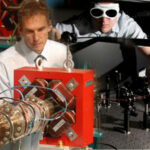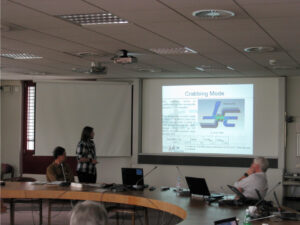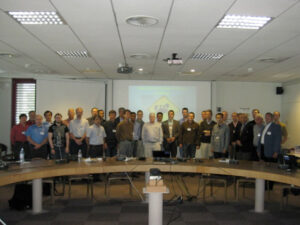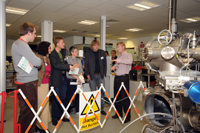
14 October 2009
England’s Northwest press release
12 October 2009
interactions.org press release
11 October 2009
Eminent early accelerator physicist, Prof. A.V. Crewe, Director Emeritus of Argonne National Laboratory, USA and graduate from Univ. of Liverpool dies at 82 years
[toggle_box]
[toggle_item title=”Prof. A.V. Crewe, Director Emeritus of Argonne National Laboratory, USA and graduate from Univ. of Liverpool dies at 82 years” active=”false”]
Prof. A.V.Crewe Biography
Message below from Jennifer Crewe.
I’m writing to let you know that my father, A.V. Crewe, who received his PhD in physics as well as an honorary degree from the University of Liverpool, died this morning in Chesterton, Indiana. He was born in Bradford, Yorkshire. He left Liverpool in 1955 to go to the University of Chicago. Crewe was Wrather Distinguished Service Professor Emeritus at the University of Chicago, former director of Argonne National Laboratory, and recipient of the Michelson Medal. I am hoping you will be able to inform people at the university and perhaps send this message to the office of public relations. I sent an email to the Liverpool Echo this morning. If there is another paper that would be appropriate to notify please let me know. I’ve attached a somewhat more detailed version of a Wikipedia article I wrote that gives the details of his life and accomplishments, but I know something formal was written up by the university when he received the honorary degree about 10 years ago.
Message below from John Dainton to Jennifer Crewe.
Please let me offer my deepest condolences to you and your family on the passing of your Father. He was a very distinguished physicist whom I never had the privilege to meet, but about whom I had recently come to know much.
I would also like to say that your Father and his achievements have been very much in my mind for almost a decade now. Please let me explain.
Some 6 years ago, in parallel with a UK government initiative to fund an expansion of accelerator science and engineering, particle physicists in Liverpool, Lancaster and Manchester Universities combined with colleagues at the Daresbury Laboratory to create a new and rather unique Institute, the Cockcroft Institute (CI). At foundation I was privileged to be asked to be Director, which I agreed to do on the understanding that the Institute should be run by a world renowned expert in the field. I am only an experimental particle physicist. It didn’t take long to find the person, and then with the help of my Vice Chancellor, we attracted Professor Swapan Chattopadhyay from Jefferson Lab and before that Berkeley to take up the Directorship. I have copied him into this email. I am now delighted to say that under Swapan’s leadership the CI is flourishing, and moreover seems to be becoming a model to be imitated elsewhere worldwide.
While I was Director, and before, I of course became closely aware of your Father’s achievements, and indeed I made the most of them in arguing the case for the funding to start the CI. I have attached an overhead which I confess to having used a number of times when trying to convince those who have money that Liverpool is the right place to back when it comes to accelerator physics, and in which you may be interested. It is absolutely clear to me and to many of my colleagues who work at CERN, DESY, Stanford, Fermilab, ESRF Grenoble, and in Japan that your Father played a crucial role in the advances achieved in the second half of the 20th century in physics.
I do hope that you and the rest of your family take great strength in your bereavement from the fact that your Father achieved so much of inestimable value throughout his life. I know I am not alone as a fellow physicist in saying that I am proud to work at the university which clearly set your Father off on his distinguished career, and to be able to say, as you see, that his achievements at Liverpool continue to this day to set the standard for us to follow.
Yours sincerely
John (Dainton)
[/toggle_item]
[/toggle_box]
9 October 2009
The Cockcroft Institute looks forward with 2020 Vision
Science and Technology Facilities Council (STFC) UK has authorized the Cockcroft Institute Core Grant for renewal and extension till March 31, 2017
University of Liverpool press releaseThe University of Manchester press release
Lancaster University press release
[toggle_box]
[toggle_item title=”The Cockcroft Institute looks forward with 2020 Vision” active=”false”]
 Following a successful peer review and subsequent competitive national and global assessment in early 2009 by an international group of experts, the Science and Technology Facilities Council (STFC) UK has authorized the Cockcroft Institute Core Grant for renewal and extension till March 31, 2017. This will see the Cockcroft Institute awarded £20.0 M since its founding in 2004, £16.3 M of which over the next eight years till 2017.
Following a successful peer review and subsequent competitive national and global assessment in early 2009 by an international group of experts, the Science and Technology Facilities Council (STFC) UK has authorized the Cockcroft Institute Core Grant for renewal and extension till March 31, 2017. This will see the Cockcroft Institute awarded £20.0 M since its founding in 2004, £16.3 M of which over the next eight years till 2017.
The Cockcroft Institute (CI) is an international centre of accelerator science and technology located adjacent to the Daresbury Science and Innovation Campus in Cheshire, UK. It is a partnership of the Universities of Liverpool, Manchester and Lancaster, STFC and the North West regional Development Agency (NWDA). Its vision is the advancement of fundamental science by means of cutting-edge research and development in the acceleration, manipulation, and delivery of beams of energetic sub-atomic particles and their associated radiation. It is to provide stewardship of the UK’s deliverables to national and international accelerator projects. The institute sets a new international paradigm of collaborative research and is an innovative global exemplar in integrating academia, national research facilities, industry and local economy under one umbrella.
The STFC award comes with a welcome long term vision, enabling the Cockcroft Institute to advance discovery class science to at least 2020. It will empower the Institute to maintain and enhance its on-going fundamental research and development in particle and photon beam science and technology; to develop innovative concepts, designs and prototypes for the next generation of accelerator facilities, and to deliver complex and sophisticated components to collaborative ventures worldwide. It will also ensure the continuity of on-going advanced education and research training for the foreseeable future, thus inspiring the next generation and preserving and enhancing a critical and vibrant national skills base in accelerator science and engineering. Taken together with its emerging collaboration with advanced industry in the UK and elsewhere, the Institute will also be able to continue to develop its direct contributions to the international competitiveness of the UK in the global challenges of energy, environment, health and security.
The STFC core grant leverages heavily on substantial matching contributions from the partnering stakeholders. When taken alongside the contributions of the other four partners, the renewed STFC funding to the Cockcroft Institute to 2017, together with the on-going funding from academia, the NWDA, the STFC and the EU, amounts to a total commitment of about £100M for the period to 2017. These funds will continue to support laboratory and scientific infrastructure, operations, staff, faculty, post-doctoral researchers and students. On the basis of the initial STFC core funding from 2004, staff in the Cockcroft Institute secured additional responsive mode grants totalling approximately £12M to date from other UK research councils and EU.
The Cockcroft Institute has had many achievements since its foundation, particularly over the past three years. In particular, it has strengthened its global partnerships, having signed comprehensive collaborative Memoranda of Understanding with large international laboratories such as CERN in Europe and equivalents in USA, Canada and Asia. It has been extremely successful in its international recruitment campaign, attracting and appointing 11 new academic faculty members to date from around the world — Germany, UK, Canada, USA, Singapore, including appointment of its Inaugural Director via an international search. Five more such appointments are now in the plans till 2012. It has been and continues to be a host for major leadership positions in global and national projects driven by accelerators in search of the big questions such as understanding the very early evolution of the Universe, probing the fundamental laws of physics, exploring the nature and origin of matter at the “sub-attometric” scale and the ultra-fast dynamics of fundamental living processes. The institute scientists have pioneered new medical and energy technologies towards particle beam cancer therapy, medical diagnostic radio-isotopes and the Accelerator-Driven Sub-critical Reactors (ADSR). Emerging innovative techniques in compact linear accelerators, in microwave, terahertz and optical frequencies, and their interaction with physical and living matter, are beginning to extend the knowledge generated at the institute to applications addressing critical needs in the areas of energy, environment, health and global security.
Swapan Chattopadhyay, Director of the Cockcroft Institute said:
“I am delighted at the exciting opportunities for growth now secured for the Cockcroft Institute by this award. At the same time I am also aware of the struggles faced by our colleagues in UK in the fundamental areas of particle physics, nuclear and photon sciences -the very fields that we accelerator scientists and technologists aspire to enable. In my privileged position as the Director of the institute, it will be one of my priorities to share our efforts and add value to the above scientific fields in the most optimised fashion achievable.”
ENDS
For more information contact:
Professor Swapan Chattopadhyay
Sir John Cockcroft Chair of Physics, Univs. of Liverpool, Manchester and Lancaster
Director, The Cockcroft Institute of Accelerator Science and Technology
T: +44 (0) 1925 603242
E: swapan@cockcroft.ac.uk
or
Prof. John Dainton
Sir James Chadwick Chair of Physics, University of Liverpool
Chief Scientist and Founding Director
The Cockcroft Institute of Accelerator Science and Technology
T: +44 (0) 151 794 7769
E: j.b.dainton@cockcroft.ac.uk
Notes to editors
The Cockcroft Institute
The Cockcroft Institute is based at the Daresbury Science and Innovation Campus in a purpose-built building and infrastructure. It was officially inaugurated in 2006 by the then UK Minister of Science Lord Sainsbury. Professor Swapan Chattopadhyay has been the Inaugural Director of the Cockcroft Institute since April 17, 2007 and holds concurrently the very first Chair in accelerator science in UK, the Sir John Cockcroft Chair of Physics jointly at the three premier research-led universities in England’s northwest – Liverpool, Manchester and Lancaster — who are partners in the institute, along with STFC’s Daresbury Laboratory and the NWDA.
The Universities of Liverpool, Manchester and Lancaster
The Universities of Liverpool and Manchester along with Lancaster University form a triangle of one of the strongest consortium of research-led universities in England’s North West. Lancaster University Physics department has been rated a 5* institution and ranked the very best, at the very top of all universities in UK in physics, in the most recent 2008 national Research Assessment Exercise (RAE) in UK. Universities of Liverpool and Manchester belong to the prestigious Russell Group of universities in UK along with Universities of Oxford, Cambridge and Imperial College and have been rated 4* in the most recent 2008 national RAE. The three universities together can lay claim to 28 Nobel prizes in the sciences to date awarded to a combination of past and present faculty, research staff and students.
http://www.manchester.ac.uk
[/toggle_item]
[/toggle_box]
9 October 2009
Research into accelerator science and technology in the UK has received a boost with the announcement of nearly £20m…
interactions.org press release
8 October
[toggle_box]
[toggle_item title=”CERN gives support to crab cavities for the LHC” active=”false”]
CERN has unambiguously supported the use of crab cavities for the phase II LHC luminosity upgrade. An official CERN statement from Steve Myers, CERN Director of Accelerators and Technology was released shortly after the 3rd LHC Crab Cavity Workshop at CERN in September.
Statements on Crab Cavities from CERN.pdf
“Following the success of KEKB, CERN must pursue the use of crab cavities for the LHC, since the potential luminosity increase is significant.”
and that the crab cavity infrastructure should be included in all other LHC upgrade scenarios. The document then goes on to state
“Crab Cavities can increase the LHC luminosity without an accompanying increase in beam intensity, thereby avoiding negative side effects associated with high intensity and high stored beam energy. This opinion has been endorsed by the general-purpose high-luminosity experiments.”
The document however does highlight machine protection issues that must be resolved before a crab cavity can be installed in the LHC.
 The Cockcroft Institute is an internationally renowned centre of excellence for crab cavity research. The CI have previously lead the designed of the crab cavity system for the ILC and are also currently in the process of designing the system for CLIC. The CI involvement in the LHC crab cavity has been focused on the design of the SRF cavity, its couplers and the LLRF system. At present the team has designed a 2-cell 800 MHz elliptical cavity with on-cell waveguide damping for the ‘global’ crab cavity scheme and a 400 MHz 4-rod parallel bar compact crab cavity for the ‘local’ scheme.
The Cockcroft Institute is an internationally renowned centre of excellence for crab cavity research. The CI have previously lead the designed of the crab cavity system for the ILC and are also currently in the process of designing the system for CLIC. The CI involvement in the LHC crab cavity has been focused on the design of the SRF cavity, its couplers and the LLRF system. At present the team has designed a 2-cell 800 MHz elliptical cavity with on-cell waveguide damping for the ‘global’ crab cavity scheme and a 400 MHz 4-rod parallel bar compact crab cavity for the ‘local’ scheme.
The crab cavity workshop jointly organised by CERN, CockcroftUS-LARP, EUCARD-ACCNET, Cockcroft Institute and KEK, made the recommendation that the international R&D should focus on the compact crab cavity designs as these are compatible with both ‘global’ and ‘local’ crab cavity schemes.
[/toggle_item]
[/toggle_box]
8 October
2nd Manchester International Workshop
Delegates from the 2nd Manchester International Workshop on Nanotechnology, Society and Policy visited The Cockcroft Institute. They were given an short presentation by Susan Smith and Elaine Seddon before going on tours of the Vacuum Lab and ALICE.
5 October
Physicists seek to keep next-gen colliders in one piece
5 October
Accelerator at DESY (DORIS ) has been critical in enabling this years Nobel prize in chemistry!
http://www.weizmann.ac.il/sb/faculty_pages/Yonath/home.html
http://www.weizmann.ac.il/
http://zms.desy.de
Accelerators, especially light sources using synchrotron radiation from bright electron beams in high quality storage rings, such being studied and innovated at the Cockcroft Instute in the context of electron-positron damping rings for the linear colliders, Super-B factories and various other light sources,are the engines that allow scientists to prepare, test, analyze and interpret the structure and function of matter, ianimate or living, at various scales. Such fundamental scientific goals are at the heart of what drives the creative and innovative spirit and conceptual development of accelerators at the Cockcroft Institute.
2 October
New Director for the John Adams Institute for Accelerator Science
It has been announced today that Professor Andrei Seryi will be the next Director of the John Adams Institute for Accelerator Science (JAI).
[toggle_box]
[toggle_item title=”New Director for the John Adams Institute for Accelerator Science” active=”false”]
It has been announced today that Professor Andrei Seryi will be the next Director of the John Adams Institute for Accelerator Science (JAI).
Professor Seryi is currently leading the work on the Facilities for Accelerator Science and Experimental Test Beams (or FACET) at the SLAC National Accelerator Laboratory in California, as well as being the leader of the Beam Delivery System for the International Linear Collider.
Professor Seryi is also deputy spokesperson for the Accelerator Test Facility collaboration, based in Japan.
‘I consider it a great honour to become the Director of John Adams Institute and I look forward to leading the excellent team at the JAI, further strengthening its role in national, European, and international projects,’ said Professor Seryi. ‘We live in an exciting time for Accelerator Science, which continues to be the major thrust behind fundamental discoveries while making an increasingly important contribution to everyday life through the applications of accelerators in industry and medicine.’
The current Director, Professor Ken Peach, said: ‘I am delighted that Andrei Seryi has agreed to be the next Director of the JAI. He brings an enormous amount of expertise in advanced accelerator techniques and a deep understanding of accelerators that will enhance the UK’s reputation in this important scientific and technological area.’
Professor Grahame Blair, the Deputy Director of the JAI, said ‘Andrei Seryi is a leading accelerator physicist with an outstanding record of innovation, and I look forward to developing with him the future programme of the JAI.’
John Womersley, Director of Science Programmes at the Science & Technology Facilities Council commented: ‘Professor Andrei Seryi is a well-respected international expert in the field of accelerator science and technology and he brings very substantial leadership experience in world-class research projects. I look forward to working with him in developing the programme of the John Adams Institute when he takes up his appointment next year. I would also like to thank Professor Ken Peach for his tremendous work and dedication to the JAI. He has played a key part in re-establishing the UK’s accelerator science capabilities and has laid a firm foundation for the future.’
Professor Seryi will divide his time between the University of Oxford and Royal Holloway University of London, who jointly host the JAI. Professor Seryi will take up his post in August 2010, and will also hold a fellowship at Wolfson College Oxford.
The JAI is funded by the Science and Technology Facilities Council (STFC).
The John Adams Institute for Accelerator Science is a joint venture between the University of Oxford and Royal Holloway University of London.
It was created in October 2004, with the aid of a grant from the then Particle Physics and Astronomy Research Council, now merged into the Science and Technology Facilities Council. Professor Peach was appointed as its Director for five years from May 2005.
[/toggle_item]
[/toggle_box]
“A hearty CONGRATULATIONS on this excellent appointment!” Prof. Dr. Swapan Chattopadhyay (Director, The Cockcroft Institute)




